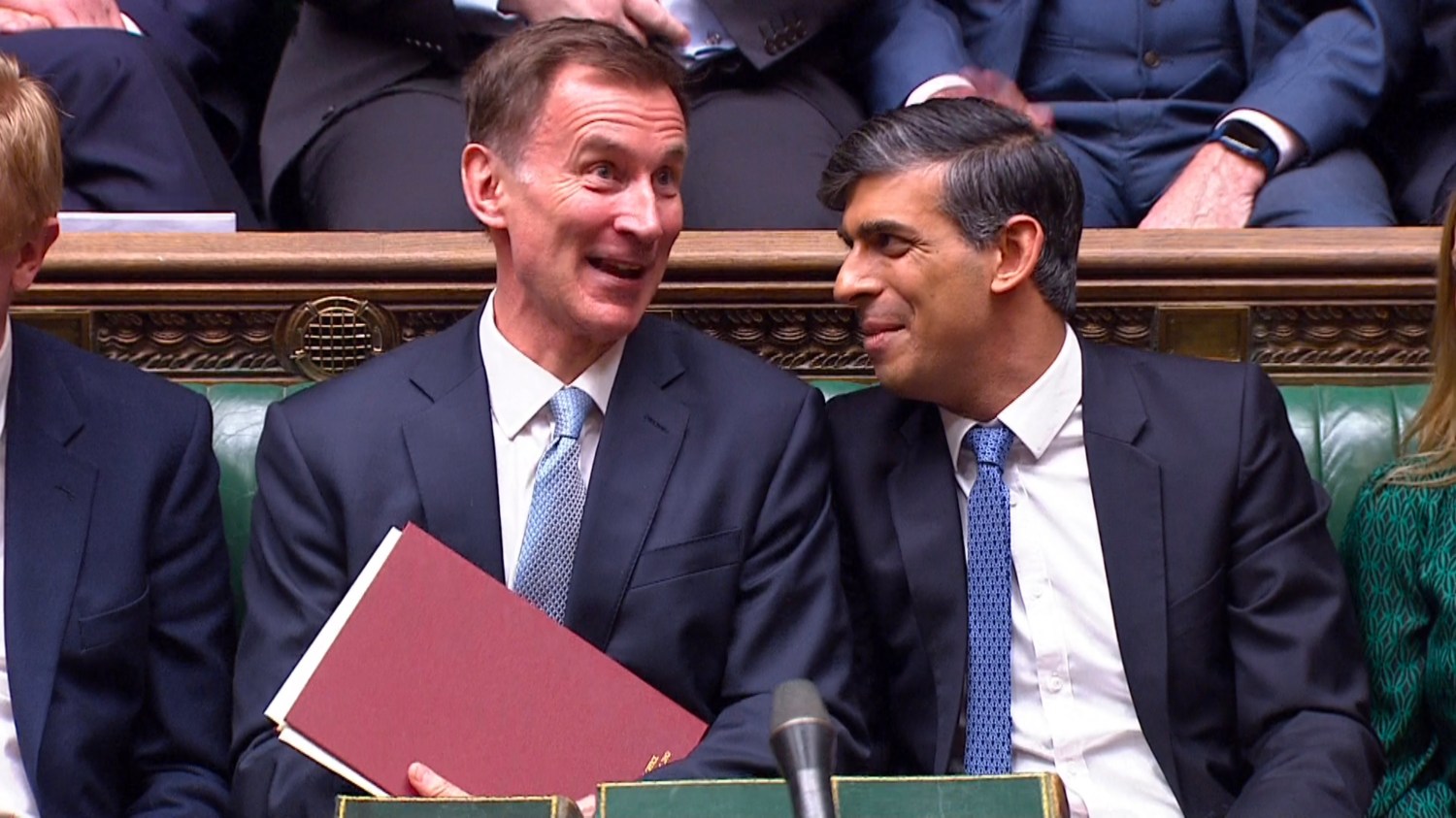Comment
The Chancellor’s fancy footwork solves nothing

THE CONDITIONAL phrase is a friend to politicians of all parties in all governments.
At its simplest, the proposition is: “If this happens, then we might be able to do this”.
The Chancellor’s Budget on Wednesday (Mar 6) was an example of the conditional phrase on steroids.
IT ALL DEPENDS
“If this happens, then that happens, and provided these things also happen, we might be in a position to consider doing this”.
As a strategy for spending on public services, it’s nonsense.
The UK Government is not in control of events that might affect its capacity to achieve even stage one of the processes that, on some far-away date, might mean it gets close to delivering public services more efficiently.
Let’s get that out of the way, for starters.
That is quite bad enough, but the Chancellor – not alone in this fiscal fraud – goes one step further.
Mr Hunt says the UK must cut its national debt, the amount it has borrowed to pay for Covid, Liz Truss, and other disasters. That objective is noble but meaningless. The debt the UK owes will rise over the next three years. It will only fall in the fifth year of the spending cycle and then only against the previous year’s debt.
That means the amount of debt the UK is in will rise over the next half-decade.
In turn, future repayments of that debt’s capital must be met out of future government revenues. The limited number of ways that can happen include refinancing the debt (putting off the payment to the future), raising taxes, and cutting public spending: probably a mix of all three.
The disingenuous lunatics on the Conservative right-wing bang on about how it’s all the Office of Budget Responsibility’s fault. The rules on debt and fiscal policy are not the OBR’s rules. They are the Chancellor’s. The OBR applies them to the Chancellor’s spending and taxation plans.
It is rather like Harold Shipman complaining he only murdered his victims because the pharmacist supplied him with poison. The intent is all on the Chancellor’s part.
Keir Starmer claimed the Government had “maxed-out” the nation’s credit card.
He is right, but only to an extent.
The central flaw in fiscal policy is that the Treasury—and therefore the Office of Budget Responsibility—fails to distinguish between borrowing and spending for investment and borrowing and spending to deliver day-to-day services and to make up for revenue shortfalls.
As Labour has chained itself to the wheel of the current spending approach, we will have to get used to paying more for less for years to come.
Any UK Government could borrow for future investment, putting the National Debt above 100% of GDP. However, that will likely increase the cost of borrowing and devalue the assets securing the current debt, such as UK Government bonds.
The markets wouldn’t wear that when Liz Truss tried it. They won’t wear it now. Borrowing more money while cutting taxes is like taking out a £500,000 loan, leaving a well-paid job that could service it, and deciding to work three shifts a week on a filling station forecourt.
Sooner or later, the bailiffs come knocking.
THE BOTTOM LINE
The political back-and-forth is interesting only to those with little stake in the Budget’s outcome, at least as it affects average families on average incomes.
A billion here, a hundred million there. Those are empty numbers.
The bottom line matters.
The Chancellor announced a cut in National Insurance from 10% to 8%. Last year, he reduced it by 12% to 10%. Forgetting, of course, that his predecessor (Sunak, R.) increased National Insurance in the first place.
However, Mr Hunt did not increase the wage level at which National Insurance starts being paid. That means the amount by which most workers on modest or average wages benefit from an NI cut will be eaten up by any pay increases they’ve received over the last two years of high inflation.
The income tax thresholds also remain stationary, pulling more people into paying the basic rate thanks to pay increases and the increased National Minimum Wage.
It’s sleight of hand. An apparent tax cut will leave people superficially better off but no richer.
In other titbits, the Chancellor announced the continuation of the 5p levy reduction on fuel for motor vehicles and a freeze on the duty on booze.
Mr Hunt also unveiled a new tax on vaping products from October 2026, linked to the levels of nicotine they deliver. At the same time, tobacco duty will rise by £2.00 per 100 cigarettes to ensure vaping remains cheaper.
From this April, the threshold at which small businesses must register to pay VAT goes up from £85,000 to £90,000. It’s something, but not much of something, as the threshold’s been frozen for the last seven years.
Mr Hunt also scrapped tax reliefs for the owners of furnished holiday lets. Holidays let owners claim capital gains tax reliefs and plant and machinery capital allowances for items such as furniture and other fixtures. At the same time, their profits can count as earnings for pension purposes.
Abolishing that tax break will save the UK government around £250 million annually starting from April 2025.
Holiday let investors could lose an average of £2,835 a year in tax, based on a property purchase price of £350,000, an annual mortgage rate of 4.5%, and £20,000 in rental income.
PUBLIC SERVICES IN LIMBO
The constant drive for “greater efficiency” in the public sector boldly and unfoundedly assumes that public service “productivity” is the same as the private sector’s. It isn’t.
Making a pin more efficiently through the division of labour is not the same as treating a patient for cancer or collecting bins.
In all efficiency drives, the point always arrives when there are no more lightbulbs or photocopiers to turn off at night, meaning savings must be found in frontline service budgets. Mr Hunt announced plans to “digitally transform” the NHS. Fat chance. The atomisation of the NHS into trusts and boards that must compete for money by offering the most at the least cost dooms the project to expensive failure.
The same applies to local government funding and extends to Wales.
Councils competing against each other for a finite pot of resources only available to spend on what the central Government insists it is spent on negates local democracy. It favours those local authorities closest to the Central Government or with the best grants application team.
Competition for funding is no way to deliver public services and leads to vanity projects.
It is better to deliver funding fairly and through a method that ensures funding follows the need for core services.
The question is acute in Pembrokeshire.
Our Council received millions of pounds in funding for projects Pembrokeshire does not necessarily need. The money would have been better allocated to the cost of adult social care delivery. However, the UK and Welsh Governments did not make tens of millions of pounds available to meet that need. Instead, we can have money for “Instagrammable bridges” and “transport hubs” because we won a prize in a competition with other broke local authorities to build things we don’t need.
It’s nonsense. And, at heart, every county councillor knows it is.
Any elected representative (whether councillor, MP, or MS) who doesn’t is unfit for public office.
Comment
Holocaust Memorial Day: The gas chambers didn’t just appear

Opinion piece by Herald editor Tom Sinclair
TODAY is Holocaust Memorial Day, January 27, 2026. Across Wales we remember the six million Jews murdered by the Nazis, and the Roma, disabled people, gay men and women, political opponents, and many others the regime labelled undesirable. We light candles, say “never again”, and tell ourselves that kind of evil is locked in the past.
But if remembrance ends at the gates of Auschwitz, we miss the real lesson.
The Holocaust did not begin with gas chambers or cattle trucks. It began in ordinary places, shops, streets, pubs, council chambers, with words that stripped people of their humanity, laws that pushed them to the margins, and propaganda that turned neighbour against neighbour. It began when ordinary people started seeing others as problems, as threats, as not really belonging.
It began with politicians pointing fingers at who to blame.
With newspapers branded enemies of the people.
With courts and rules quietly bent.
With minorities held responsible for hard times.
With cruelty sold as common sense.
And above all, it began with silence.
Last week in Milford Haven, I saw that silence in action.
A shopkeeper, someone who came here from another country, set up a business, pays his way and serves the town, was racially abused inside his own shop. He tried to stop a man walking out with unpaid beer. For doing his job, he was told to “go back home”, told he was not welcome. The thief responded by sweeping stock off the shelves and smashing it onto the floor.
I asked why he did not ring the police. His answer came straight away. “What’s the point? They won’t do anything. It’ll just happen again tomorrow.”
That exchange stuck with me. Not because it was uniquely shocking, but because it felt horribly familiar. No new laws. No uniforms. No symbols. Just raw contempt, casual racism, and the shared understanding that nothing would come of it. A man contributing to the community was made to feel like an outsider in his own workplace, and he had already lost faith that anyone would step in to protect him.
This is how it starts. Abuse becomes normal. Victims stop reporting because experience has taught them the system will not respond. Prejudice is dismissed as “just words” or “banter”. Indifference takes hold.
We are often told not to make comparisons, not to be alarmist, not to link today with that past. Fair enough. History does not repeat itself in neat patterns. But it does move in stages, and the most dangerous stage is the one people fail to notice. The slow normalisation of division, cruelty and disregard.
In towns like Milford Haven, Haverfordwest and Pembroke Dock, places built on hard work and looking out for one another, we know what community means. We have weathered closures, recessions and hardship together. We do not turn away when one of our own is targeted.
Yet when a shopkeeper loses faith that the police or the public will stand with him, something vital erodes. When hate goes unchecked, the ground is quietly prepared for worse.
Holocaust Memorial Day is not about guilt. It is about vigilance. It asks the hardest question of all. Not what monsters once did, but what ordinary people allowed by doing nothing.
The worst crimes in history were not announced in advance. They were built quietly, policy by policy, lie by lie, while too many looked the other way.
That is why we still remember today. And why, in our Welsh towns, remembering must mean refusing silence.
If you see it, say something. If you hear it, challenge it. If someone is targeted, stand with them. Because “never again” only holds if we make it hold, here and now, in the places we live.
Comment
When the System Decides: AI, authority and the quiet loss of human judgment

OPINION: BY PAUL DOWSON
ARTIFICIAL INTELLIGENCE is no longer a future technology. It is not waiting for legislation, ethical consensus, or public debate. It is already here, embedded in systems that exercise immense power.
AI is in our warplane cockpits.
That single fact should change the entire conversation. This is not about chatbots or convenience. It is about authority: who holds it, who hides behind it, and who is left accountable when things go wrong.
In modern military aircraft, AI systems assist with navigation, threat detection, targeting support, and reaction timing. They operate at speeds no human can match. The case for their use is compelling. Machines do not panic, tire, or hesitate. In combat environments, hesitation costs lives.
So why should we be concerned?
Because the real risk of AI is not that it will suddenly develop malicious intent. That idea belongs to science fiction and distracts us from a far more ordinary, and far more dangerous, reality. AI is increasingly treated as neutral.
Neutral systems are trusted. Trusted systems stop being questioned. And what is no longer questioned quietly becomes authority.
We already live under layers of process. Decisions are routinely explained away with phrases like “policy”, “procedure”, or “the system”. AI is the most powerful extension of this trend yet. It produces outcomes while making it harder to say who actually decided.
In civilian life, this is already happening in areas such as welfare and public services. Eligibility decisions are increasingly shaped by automated scoring systems. Someone can be denied support, flagged for investigation, or pushed down a queue not because a person made a judgment, but because “the system says” they do not qualify. The outcome feels final, yet the assumptions embedded in the model are rarely visible, and almost never open to meaningful challenge.
When responsibility is pushed into a system, accountability evaporates. No one “decided”. The model ran. The process was followed.
I have seen first-hand how “objective” systems can be steered toward particular outcomes without anything that looks like corruption. It does not require conspiracies or secret meetings. It happens through design: what data is used, what is left out, how success is defined, how risk is weighted.
To the public, the result looks inevitable.
To those who understand the system, it is engineered.
AI magnifies this effect dramatically. Once systems become complex enough, very few people can meaningfully challenge them. “The model says” becomes the end of the conversation. Questioning outcomes starts to sound like ignorance rather than scrutiny.
Supporters of AI are right: automation has already saved lives. Aircraft are safer today precisely because computers assist, and sometimes override, human pilots. In dangerous environments, AI can see more, calculate faster, and respond sooner than any person ever could.
Refusing to use such tools would be irresponsible.
That argument deserves to be taken seriously. But it still misses the deeper issue.
What starts as assistance becomes reliance.
Reliance becomes deference.
And deference becomes authority.
Over time, humans stop deciding and start supervising. The human becomes the back-up. Judgment becomes confirmation. The key question quietly shifts from “Is this the right decision?” to “Is there any reason to override the system?”
That shift matters. Because once humans are no longer the primary decision-makers, responsibility becomes a formality rather than a reality.
We are told AI can be audited. In theory, yes. In practice, real scrutiny requires expertise, access, and the power to challenge outcomes. Most people, including many decision-makers, do not have these. For them, the system’s output is effectively unquestionable.
And systems are never neutral. They reflect priorities: military objectives, political pressures, funding decisions, strategic advantage. AI does not remove human values from decisions. It buries them beneath complexity.
What is happening in military aviation will not remain confined there. The same logic is already spreading into finance, policing, welfare systems, hiring decisions, and border control. Everywhere AI is positioned as an objective arbiter, responsibility becomes harder to locate and harder to contest.
The greatest danger is not that machines will decide badly. It is that humans will lose the habit, and the authority, of deciding at all.
I support AI. Its potential is extraordinary. Used properly, it can enhance human judgment, reduce error, and save lives. But if we fail to shape how it is deployed, we risk building systems that do not supplement us, but quietly replace us.
AI does not need consciousness to reshape power.
It only needs our trust.
And trust, once handed over, is rarely reclaimed.
Author bio

Paul Dowson is a former independent county councillor in Pembrokeshire (2017–2022) and has spent his career in business management and communications. He supports the adoption of artificial intelligence where it strengthens human decision-making, but argues it must never become a substitute for accountability or judgment.
Comment
Should the King cancel the US state visit in April? Yes — and he should say why

OPINION – BY TOM SINCLAIR, EDITOR
THE KING is not a politician. He is, however, the Commander-in-Chief of the British Armed Forces. That distinction matters, because it draws a line between everyday diplomacy and something more fundamental: respect for service, sacrifice, and the people this country asks to stand in harm’s way.
On that basis, the scheduled state visit to the United States in April should not go ahead as planned. It should be postponed indefinitely — and the reason should be made clear, quietly but firmly: Britain will not wrap ceremonial honour around rhetoric that demeans those who serve.
That is the crux of it. The issue is not a petty spat, a bruised ego, or an argument about “who said what” on social media. It is the principle of how allies speak about allied forces — and whether the United Kingdom is prepared to smile, toast and wave through remarks that, in the eyes of many serving personnel, veterans, and military families, amount to a straight insult.
You can hear it in the public reaction. People who would rarely write to a King or comment on foreign policy are suddenly saying the same thing in plain language: if the Head of the Armed Forces carries on regardless, it feels like a slap in the face to those who “stood the line” — and to the families of those who did not come home. Some are calling for a postponement “until there is an apology”. Others say: don’t postpone — cancel. Underneath the anger, there is a consistent instinct: dignity matters, and so does loyalty.
Now add the awkward history. Not so long ago, Donald Trump received the full ceremonial treatment in Britain. A banquet. The gold-trimmed theatre of state. All presented as diplomatic necessity, above politics, in the national interest.
Did it work? Did it moderate language, build respect, reduce volatility, improve conduct? If anything, it taught the opposite lesson: that Britain will keep offering prestige even when it gains nothing in return. The Crown’s soft power was put on display, and the recipient treated it like another trophy.
That is why doing it again now would be worse than a mistake. It would be a pattern.
Supporters of the trip will reach for the familiar argument: Britain’s relationship is with the United States, not with one individual. And that is correct. Defence, intelligence, trade and security cooperation are too important to be thrown around as gestures.
But a state visit is not the machinery of government. It is the highest honour we can confer. It is symbolism in its most potent form. It is an embrace.
And there is a difference between continuing diplomacy and offering ceremony.
Britain can and should continue the serious work through ministers, ambassadors, defence chiefs and officials. That work is robust enough to survive a postponement of pageantry. What it cannot survive — at least not without cost — is the impression that the country’s top symbol of service is prepared to overlook contempt directed at service.
There is also a constitutional realism that needs saying out loud. The King does not freelance. He acts on ministerial advice. That means the responsibility for this does not sit with one man in one palace. It sits with the government of the day. If the visit goes ahead, it will not be interpreted internationally as a “neutral royal engagement”. It will be interpreted as a British national choice.
Which raises a simple question: why would Britain choose, voluntarily, to place its Commander-in-Chief into the middle of America’s partisan furnace — where every handshake becomes a headline and every photograph becomes a message?
The monarchy’s strength is that it is not supposed to take sides. Yet the more polarised the environment, the harder neutrality is to maintain. A state visit in April risks being treated as an endorsement by one camp and a provocation by the other. That is not only unfair to the King; it is dangerous for the institution. No head of state should be used as a campaign prop, least of all one whose constitutional role depends on being above the fight.
So what should happen?
The government should advise postponement on grounds that are unarguable and non-partisan: respect for allied forces and the need to keep the Crown out of domestic political controversy abroad. The Palace should keep the language measured: a desire to reschedule at a more appropriate time, in a way that reflects the enduring UK-US relationship and the importance of mutual respect between allies.
And if there is to be a condition for reinstating the visit, it should be simple: a clear, public reaffirmation of respect for NATO service personnel and the sacrifices made by military families. Not a grovelling performance. Not a media circus. Just a statement of basic decency that any ally should be able to make without choking on it.
Some will say Trump never apologises. That may be true. But the point is not to choreograph an apology. The point is to stop granting honours as if they are automatic.
Because Britain has already tried the “butter him up and hope for the best” approach. We’ve seen the banquet. We’ve watched the pageantry. We’ve heard the rhetoric continue.
At some stage, a grown-up country has to decide what it will and won’t dignify.
If the King is the head of our armed forces in name, then he must be the head of our armed forces in meaning too. That means he cannot be asked to raise a glass to a man whose words have demeaned the very people the Crown is meant to honour.
Postpone the state visit. Keep the diplomacy. Protect the institution. And, above all, stand by the men and women who stood for us.
-

 Health5 days ago
Health5 days agoConsultation reveals lack of public trust in health board
-

 News6 days ago
News6 days agoCaldey still unsafe, survivors warn — despite Abbey’s reform claims
-

 Community5 days ago
Community5 days agoPembrokeshire students speak at national Holocaust Memorial Day event
-

 News6 days ago
News6 days agoKurtz raises Gumfreston flooding in the Senedd as petition deadline nears
-

 Community7 days ago
Community7 days agoStorm Chandra: Morning impacts across Pembrokeshire
-

 Entertainment7 days ago
Entertainment7 days agoRapunzel brings festive magic to Torch Theatre
-

 Crime7 days ago
Crime7 days agoMan denies murdering brother as jury hears of ‘ferocious attack’ at Morriston flat
-

 Education5 days ago
Education5 days ago‘Vulnerable teen’ questioned by police at Milford Haven School


























